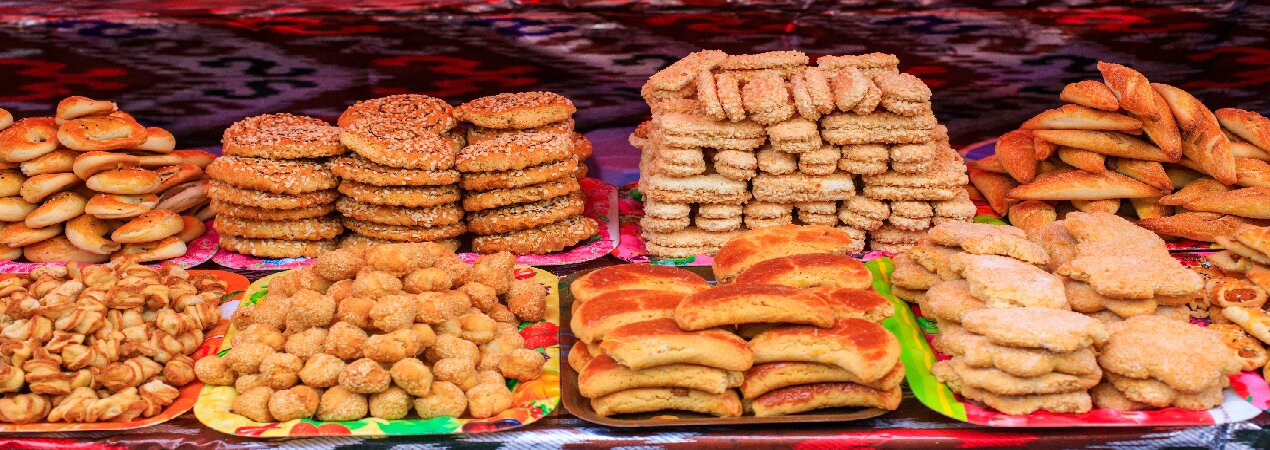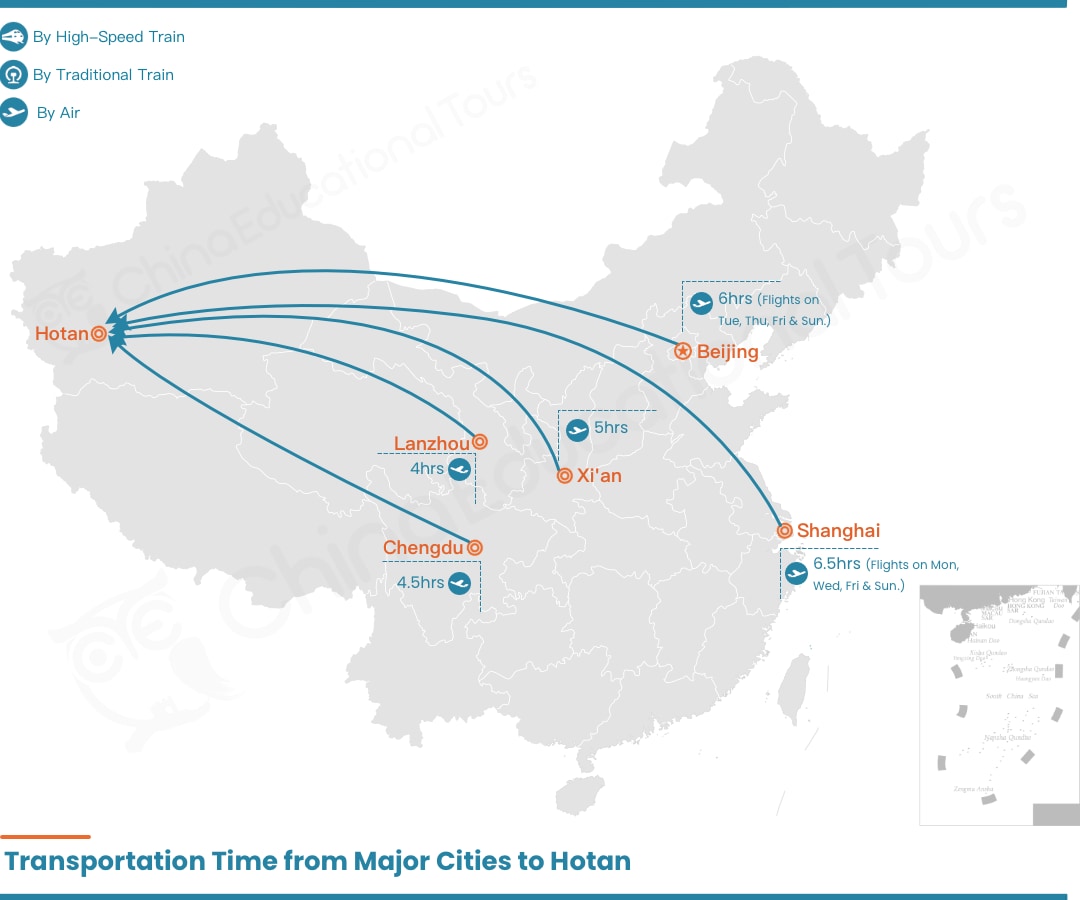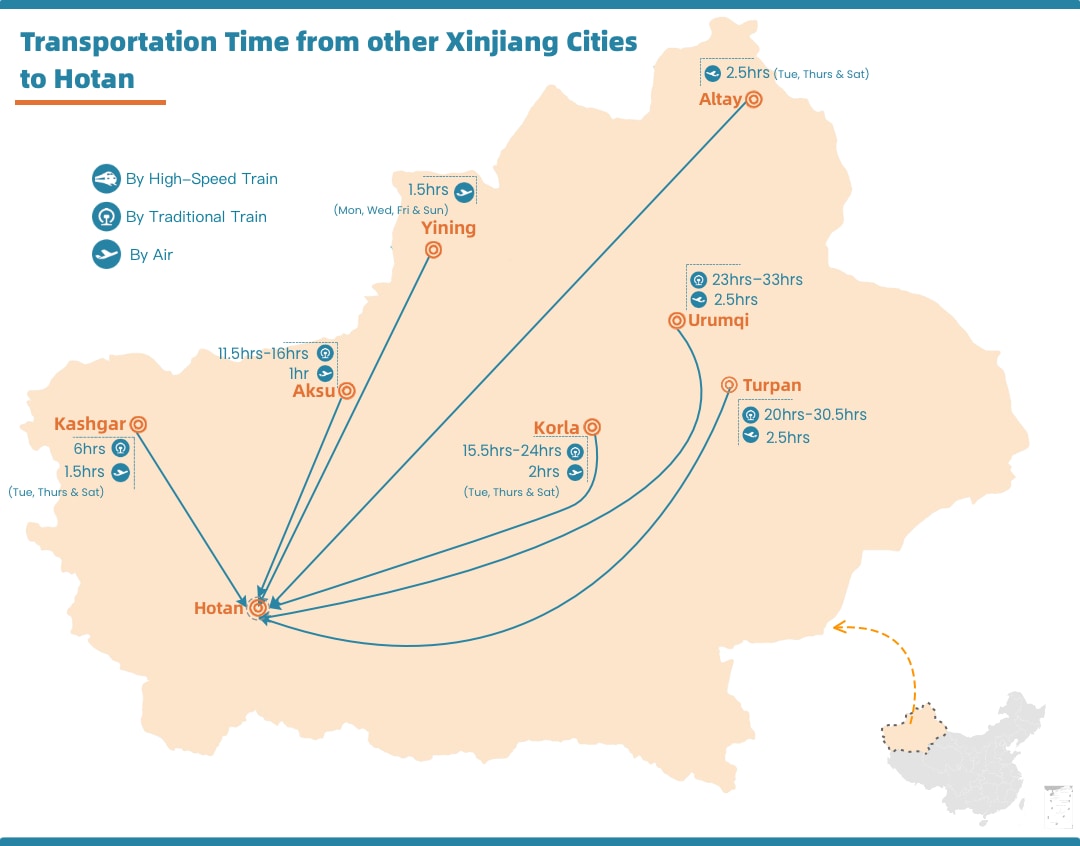Hotan Travel Guide

Hotan, located at the southernmost tip of Xinjiang, leans against the Kunlun Mountains to the south and borders the Taklimakan Desert to the north. Since ancient times, it has been a vital town on the southern route of the Silk Road and an important hub for the exchange and dissemination of Eastern and Western civilizations, boasting a gathering of diverse cultures and profound historical and cultural accumulation. Hotan has a warm temperate continental desert climate, with arid and rainless weather throughout the year and frequent sandstorms.
- English Name: Hotan
- Chinese Name: 和田(hé tián)
- Government: A region in Xinjiang Uygur Autonomous Region
- Location: Southernmost part of Xinjiang, China (Roughly around 37.12°N, 79.92°E)
-
Area code & Zip Code:
Area Code: 0903; Zip Code: 848000 - Airports:Hotan Kungang Airport (HTN)
-
Railway Stations:
Hotan Railway Station -
Suburban Districts:
Hotan City, Moyu County, Pishan County, Luopu County, Qira County, Yutian County, Minfeng County - Population: About 2,504,718
Best Time to Visit Hotan
Spring (April-May) and autumn (September-October) are the best times to travel to Hotan. The temperature is moderate and the scenery is the most beautiful, which is very suitable for outdoor activities and travel. Summer is too hot; winter is cold and some attractions may be closed. Hotan holds some traditional folk activities and cultural festivals in spring. You can deeply experience the local ethnic customs and cultural charm and feel the unique regional culture of Hotan.
What to See
1. Yulong Kash River / White Jade River: It is a major producing area of white jade, with 36 types of Hotan jade including sapphire, bluish white jade, yellow jade, jasper, and white jade, among which the most precious is the suet jade collected from the river.
2. Hotan Museum: The Hotan Museum integrates relics collection, protection, display, research and education, and is a cultural landmark of Hotan. It has a basic display of Hotan's history and culture, a special hall for the Niya Ruins, and nearly 10,000 relics (bronzes, pottery, jade, textiles, etc.). Through displays and multimedia, it shows Hotan's long history and splendid culture, serving as an important window to understand its history and culture.
3. Hotan Night Market: Known as a "late-night canteen", the Hotan Night Market is a must-visit for tourists when they come to Hotan. Visitors have highly praised the night market's food, performances, and environment, considering it a place with unique characteristics, a comfortable setting, and an enduring charm that makes people reluctant to leave.
4. Yotkan Ancient City: It is a characteristic town integrating the functions of culture, tourism, commerce and leisure. Resembling a huge white castle, it features traditional dwellings with white as the main color, matched with colored paintings on corridors and eaves, brick carvings, wood carvings and window lattice decorations, all of which give it unique characteristics.
Recommended attractions:
| Yulong Kash River / White Jade River | Hotan Museum | Hotan Night Market |
| Yotkan Ancient City | Taklimakan Desert | Tuancheng Scenic Area |
How to Get There
Hotan Kungang Airport (HTN) has a rich network of routes, connecting to many domestic cities such as Beijing, Shanghai and Xi'an, as well as cities within Xinjiang like Kashgar and Aksu. It is operated by multiple airlines including Air China, China Southern Airlines and China Eastern Airlines.
How far is Hotan from Major Cities

| Cities | Distance from Hotan (km) | By Air to Hotan | By High-Speed Railway to Hotan | By Traditional Train to Hotan |
|---|---|---|---|---|
| Beijing | 4008 | 6hrs (Flights on Tuesday, Thursday, Friday, Sunday) | No direct high-speed trains | No direct traditional trains |
| Shanghai | 4636 | 6.5hrs (Flights on Monday, Wednesday, Friday, Sunday) | No direct high-speed trains | No direct traditional trains |
| Xi'an | 3268 | 5hrs | No direct high-speed trains | No direct traditional trains |
| Chengdu | 3007 | 4.5hrs | No direct high-speed trains | No direct traditional trains |
| Lanzhou | 2643 | 4hrs | No direct high-speed trains | No direct traditional trains |
How far is Hotan from Other Xinjiang Cities

| Cities | Distance from Hotan (km) | By Air to Hotan | By High-Speed Railway to Hotan | By Traditional Train to Hotan |
|---|---|---|---|---|
| Kashgar | 498 | 1.5hrs (Flights on Tuesday, Thursday and Saturday) | No direct high-speed trains | 6hrs |
| Altay | 1916 | 2.5hrs (Flights on Tuesday, Thursday and Saturday) | No direct high-speed trains | No direct traditional trains |
| Aksu | 553 | 1hr | No direct high-speed trains | 11.5hrs-16hrs |
| Urumqi | 1418 | 2.5hrs | No direct high-speed trains | 23hrs–33hrs |
| Turpan | 1306 | 2.5hrs | No direct high-speed trains | 20hrs-30.5hrs |
| Korla | 954 | 2hrs (Flights on Tuesday, Thursday and Saturday) | No direct high-speed trains | 15.5hrs-24hrs |
| Hami | 1563 | No direct flights | No direct high-speed trains | No direct traditional trains |
| Yi'ning | 1234 | 1.5hrs (Flights on Monday, Wednesday, Friday, Sunday) | No direct high-speed trains | No direct traditional trains |
Gourmet Food Recommendations
Roasted Lamb is a specialty dish in Xinjiang. It uses high-quality sheep and is specially roasted. It is crispy on the outside and tender on the inside, and the aroma is fragrant.
Baked Bun has a crispy skin and fresh, savory fillings. It is a common snacks in the streets and alleys of Hotan.
Hand-pulled rice (Polu) is a top-notch delicacy for locals to entertain guests. The main ingredients are rice, mutton, carrots and onions. The rice stewed with these ingredients is fragrant and delicious.
Souvenir and Shopping
 Hotan Dates
Hotan DatesHotan Jade: Xinjiang has been famous for its beautiful jade since ancient times, and Hotan jade is the most renowned. Hotan jade was continuously exported to the Central Plains and Eurasian markets in ancient times, becoming a rare treasure for court nobles.
Hotan Dates: Hotan Dates are a specialty of Kunyu City in Hotan, Xinjiang, and are known as the "nobles among dates". The vitamin C content of Hotan Jade Dates is 70 to 80 times higher than that of apples, and the carbohydrate content is higher than that of various vegetables and other fruits. They are very good food supplements.
Hotan Carpets: Carpet production in Hotan has a history of more than 2,000 years. Hotan carpets belong to the oriental ethnic handicraft carpet system, with semi-coarse wool fibers used as raw materials. The carpets are of various styles, with unique patterns, elegant designs, and rich colors.